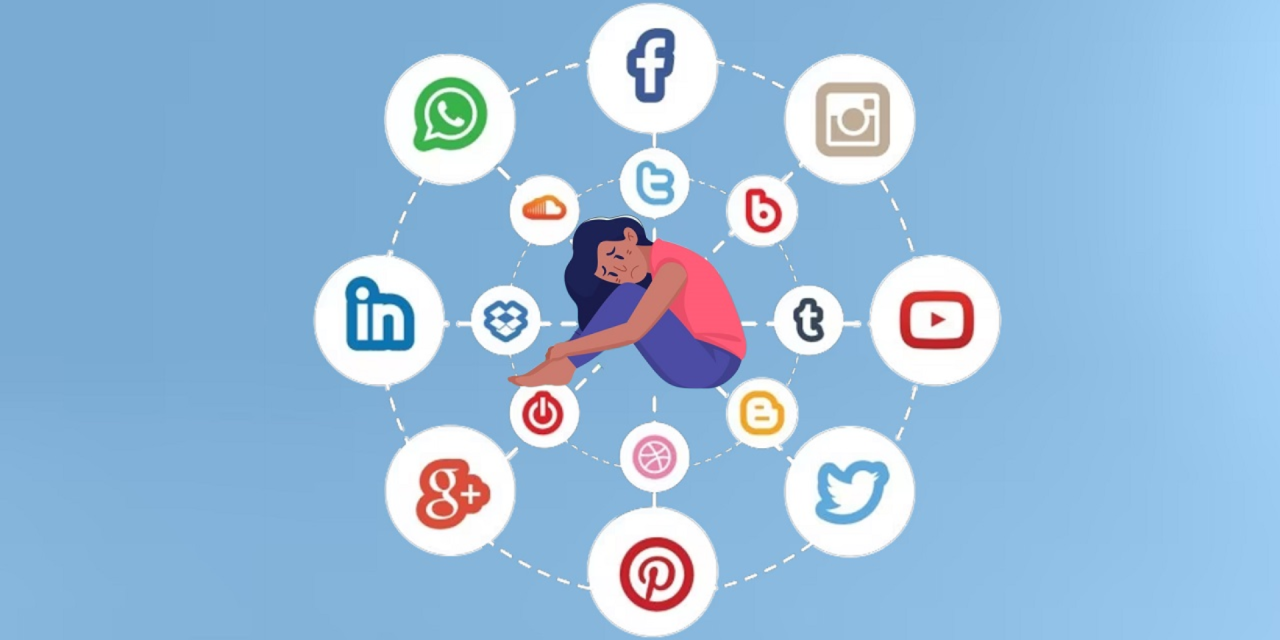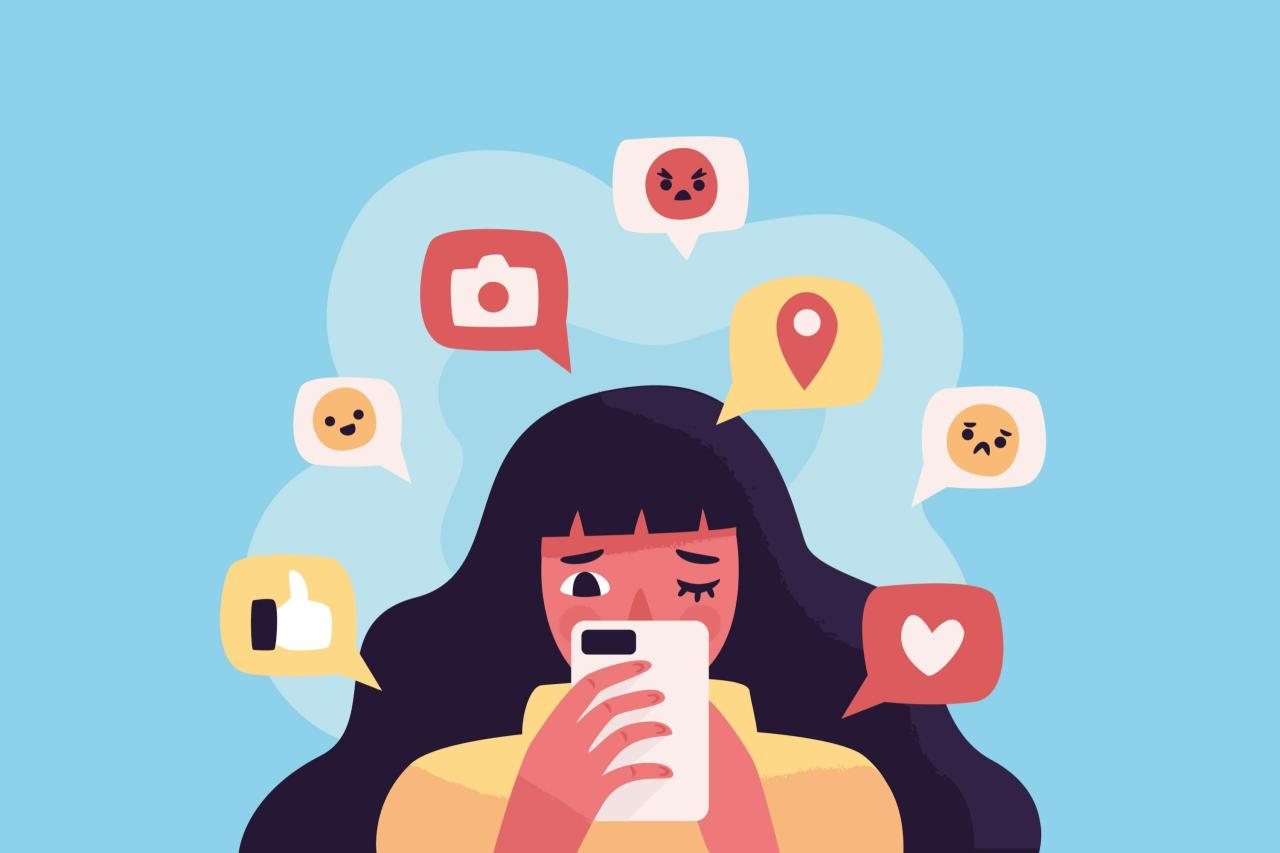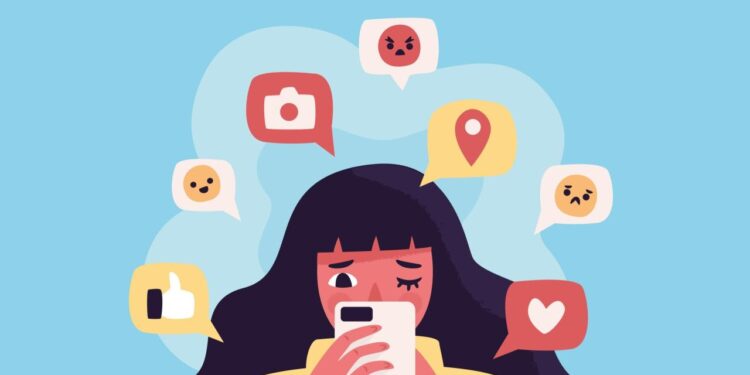Beginning with Social Media and Its Impact on Emotional Digilife, the narrative unfolds in a compelling and distinctive manner, drawing readers into a story that promises to be both engaging and uniquely memorable.
As we delve into the realm of Social Media and Emotional Digilife, we uncover the intricate relationship between our online presence and emotional well-being.
Introduction to Social Media and Emotional Digilife
Social Media refers to online platforms and websites that allow users to create and share content with others. Emotional Digilife, on the other hand, pertains to the emotional experiences and interactions that individuals have in the digital realm.
Social Media has a profound impact on Emotional Digilife by shaping how people communicate, express themselves, and form connections online. It can influence emotions such as happiness, anxiety, loneliness, and even self-esteem.
Examples of Emotional Experiences Influenced by Social Media
- Social Comparison: Users often compare themselves to others based on the curated content they see on social media platforms. This can lead to feelings of inadequacy or jealousy.
- Fear of Missing Out (FOMO): Seeing posts about events or activities that one was not invited to can trigger feelings of loneliness or anxiety about missing out on experiences.
- Cyberbullying: Negative comments or harassment on social media can have a significant impact on an individual's mental health and emotional well-being.
- Validation and Approval: Receiving likes, comments, and shares on posts can provide a sense of validation and boost self-esteem, while a lack of engagement can lead to feelings of rejection.
Positive Impact of Social Media on Emotional Digilife

Social media has the power to enhance emotional well-being in various ways. It provides a platform for individuals to connect, share experiences, and express themselves, ultimately fostering a sense of belonging and support in the digital world.
Enhancing Emotional Well-being
- Through social media, individuals can find like-minded communities that offer support, understanding, and validation for their emotions and experiences.
- Engaging with positive content, such as inspirational stories, motivational quotes, and uplifting messages, can boost mood and overall emotional state.
- Sharing personal achievements, milestones, and happy moments on social media allows for celebration and encouragement from others, leading to increased self-esteem and happiness.
Success Stories
- One success story involves a young woman who found solace in an online mental health community, where she received guidance, empathy, and solidarity during her struggles with anxiety and depression.
- Another individual credits social media for helping them discover a passion for photography, leading to a fulfilling hobby that brings joy and purpose to their life.
- Many people have shared how acts of kindness, generosity, and compassion on social media have touched their hearts and restored their faith in humanity.
Promoting Positivity
- Social media campaigns and movements focused on mental health awareness, self-care, and positivity serve as powerful reminders for individuals to prioritize their emotional well-being.
- Online challenges that encourage acts of kindness, gratitude, and mindfulness contribute to a culture of positivity and emotional growth within the digital community.
- Platforms that facilitate emotional expression through creative outlets, such as art, music, writing, and storytelling, empower individuals to share their innermost thoughts and feelings authentically.
Negative Impact of Social Media on Emotional Digilife

Social Media has become a double-edged sword in the realm of emotional well-being, as it has the potential to cause negative impacts on individuals' mental health.
Isolation and Loneliness
Social Media platforms can create a false sense of connection, leading individuals to substitute online interactions for real-life relationships. This can result in feelings of isolation and loneliness, ultimately affecting emotional well-being
Cyberbullying and Harassment
The anonymity provided by Social Media can embolden individuals to engage in cyberbullying and harassment, causing emotional distress and trauma to the victims. The constant exposure to negative comments and hurtful messages can have a detrimental impact on mental health.
Comparison and Self-Esteem Issues
Excessive use of Social Media can lead to constant comparison with others, creating unrealistic standards and fostering feelings of inadequacy. This can result in lowered self-esteem, anxiety, and depression as individuals strive to meet unattainable ideals portrayed on social platforms.
Addiction and Mental Health Struggles
The addictive nature of Social Media, characterized by endless scrolling and constant engagement, can lead to decreased productivity, disrupted sleep patterns, and heightened anxiety. This can exacerbate existing mental health struggles and contribute to a cycle of negative emotions.
Coping Strategies for Managing Emotional Well-being on Social Media
As we navigate the complex landscape of social media, it is essential to prioritize our emotional well-being. Here are some coping strategies to help you maintain a healthy balance while engaging online:
Limit Your Screen Time
- Set specific time limits for social media usage each day to prevent overexposure.
- Take breaks from scrolling and engage in offline activities to recharge your mental health.
Practice Self-care
- Engage in activities that bring you joy and relaxation, such as exercise, meditation, or hobbies.
- Ensure you get enough sleep and maintain a healthy diet to support your overall well-being.
Engage Positively
- Follow accounts that inspire and uplift you, promoting a positive online environment.
- Share content that adds value and contributes to meaningful conversations within your social network.
Seek Support When Needed
- Reach out to friends, family, or mental health professionals if you are struggling with negative emotions triggered by social media.
- Join online communities or support groups that provide a safe space for sharing experiences and seeking advice.
Set Boundaries
- Establish clear boundaries for your social media use, such as limiting interactions with toxic individuals or unfollowing accounts that negatively impact your mental health.
- Be mindful of your emotional responses to content and conversations online, and take steps to protect your well-being.
Summary

In conclusion, the discussion surrounding Social Media and Emotional Digilife highlights the need for a balanced and mindful approach to our online interactions, ensuring that our digital experiences contribute positively to our emotional health.
Quick FAQs
How can Social Media impact emotional well-being?
Social Media can influence emotions through interactions, content exposure, and comparison with others, affecting self-esteem and overall mood.
What are some coping strategies for managing emotional well-being on Social Media?
Setting boundaries, limiting screen time, curating a positive feed, and seeking support offline are effective ways to maintain emotional balance online.
Can excessive Social Media usage lead to mental health issues?
Yes, excessive use of Social Media has been linked to increased feelings of anxiety, depression, loneliness, and reduced self-esteem, impacting mental well-being.












